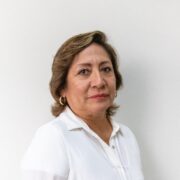Cycling Cities

Cycle lane networks are quick to build compared to other transport infrastructure, generating climate, health, and economic benefits in the near term, and often paying for themselves in just a few years. Cycle infrastructure networks are one of the most cost-effective strategies to reduce greenhouse gas emissions from the urban passenger transport sector, however they have been under-invested in and overlooked in favor of larger, more expensive transport projects.
A new report co-authored by ITDP and the World Bank makes the case for scaling up financing for bicycle and pedestrian infrastructure. Case studies show that the return on investment for cycle lane networks is high—both in terms of the network effects from supporting other transport investments like metro or bus rapid transit (BRT) and the resulting climate, health, and economic benefits. In this webinar, panelists will discuss how governments, financial institutions, and philanthropic and civil society organizations can increase investment in active mobility projects as a means to achieve broader transport, climate, and economic goals.
This event will feature live interpretations in Spanish.

Dana’s (she/her/hers pronouns) work at ITDP includes research and analysis of trends in sustainable transportation focused primarily on cycling, bikeshare, and other forms of shared mobility. She has led the development of key ITDP publications including the 2018 Bikeshare Planning Guide, and several policy briefs including Optimizing Dockless Bikeshare for Cities and Ride Fair: A Policy Framework for Managing Transportation Network Companies. Dana is passionate about identifying connections between the social, economic, and environmental spheres of sustainable development, with a particular interest in providing guidance to cities to strengthen transportation networks, leverage emerging technology and innovations, and improve overall accessibility. Prior to joining ITDP in 2017, Dana worked for the Chaddick Institute for Metropolitan Development in Chicago, and for Resources for the Future, an environmental economics think tank in Washington, DC. She holds an MA in Sustainable Urban Development from DePaul University.

Elvira is currently the Urban Mobility Manager of the Metropolitan Municipality of Lima. Prior to that, she held roles as a Manager of Sustainable Mobility of the District Municipality of La Molina, Manager of Urban Transportation of the Metropolitan Municipality of Lima, Advisor in the Ministerial Office in the Ministry of Transport and Communications, first Director Municipal Urban Transportation of Lima. Elvira has extensive experience in managing and guiding public and private companies in areas of transportation, inspection, citizen security, industry and services, with a focus on service to citizens and reduction of social impact.
She holds master’s degrees in Risk Management at EALDE Business School and Business Administration and Management from the Universidad Católica San Antonio,Spain.

Winnie Wang is a Lead Transport Specialist and Infrastructure Program Leader with the World Bank Group. Professionally trained in transport planning, she has led diverse operations including urban mobility, road connectivity, railway reforms and logistics improvements in three regions of the Bank. Winnie is also the co-lead of the Global Knowledge Group for Inclusive Urban Mobility and Accessibility.
Prior to joining the Bank, Winnie worked at the Washington Metropolitan Area Transit Authority for Metrorail planning, and Transport for London for intermodal transport planning with big data application. Winnie is a graduate of the Massachusetts Institute of Technology.